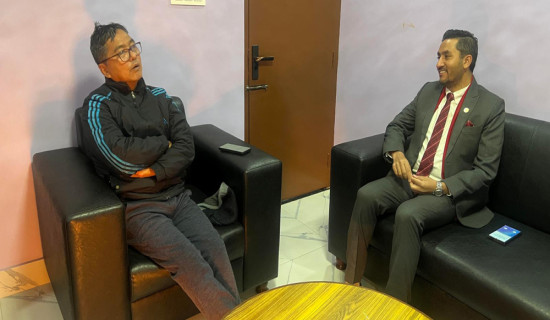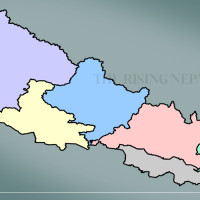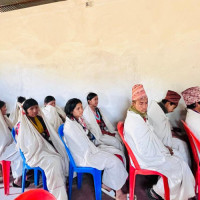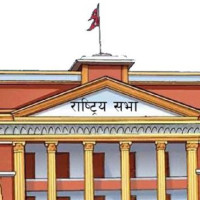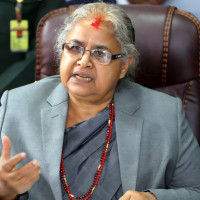- Wednesday, 7 January 2026
ICT, agriculture our main focus in Nepal: Park
Park Tae-young is the Ambassador of the Republic of Korea to Nepal. Park joined public service in 1996. He holds an MA degree in International Trade Policy from the Monterey Institute of International Studies, California, USA. Before being appointed Ambassador to Nepal, Park served as a Counsellor at the Korean Embassies in Geneva, Egypt, and Germany, and later assumed the position of Director General for International Economic Affairs, Ministry of Foreign Affairs. Recently, he spoke to the Acting Editor-in-Chief of The Rising Nepal, Bishnu Prasad Gautam, and Reporter Laxman Kafle on Nepal-Korea relations and other issues. Excerpts:
Your Excellency, how do you find Nepal and its people during your stay in Kathmandu as the Korean Ambassador to Nepal?
I am very honoured to have served as the Ambassador of Korea to Nepal for the past two-and-a-half years. Nepali people are truly welcoming and warm-hearted — the friendliest I have ever met. I have countless examples of their generosity and warmth.
I am always amazed by the stunning nature and cultural diversity of the Nepali people that I notice whenever I visit different parts of this beautiful country. So, I really enjoy my job here, and I'm trying to do my best to strengthen our friendship between Nepal and Korea.
Now South Korea is marking the National Day. Will you share with our readers about the celebrations?
Our National Day actually falls on October 3, and we were supposed to host National Day celebration in mid-September. But, here, we witnessed the Gen Z movement in early September, so we postponed it for November 12. Our National Day event commemorates the founding of the first nation-state on the Korean Peninsula in 2333 BC.
Would you update the current situation in the Korean Peninsula?
Everybody knows in the Korean Peninsula, there are two Koreas-- North and South Korea. At the moment, in the Korean Peninsula, there is no constructive dialogue or engagement between the two Koreas. In fact, in the Korean Peninsula, there is a strong tension. However, our current government wants to explore any possibility of dialogue and engagement with North Korea. South Korea has emphasised principles for peace in the Korean Peninsula: denuclearisation, step by step, easing tension through dialogue.
We want to initiate again the dialogue and engagement with North Korea and build trust between the two Koreas. Korea appreciates valuable support for the peaceful resolution in the Korean Peninsula.
South Korea has been one of the development partners of Nepal. What are the priority areas of South Korean development assistance to Nepal?
Yes, we have been carrying out development projects in every corner of Nepal. Actually, this year marks the 30th anniversary of the establishment of the Korea International Cooperation Agency (KOICA) office in Kathmandu. At the same time, Nepal has been one of our priority development cooperation partners for 15 years. This year is also the 51st anniversary of the establishment of diplomatic relations between Korea and Nepal.
We are primarily focusing on four key areas: education, agriculture, health, and Information and Communication Technology (ICT). In particular, in the field of education, we are emphasising vocational training, as we firmly believe that skilled workers are essential for economic growth and development from our own experience. We have supported the establishment of five vocational training facilities in five different provinces. Some of these centres have already started operation while others are under construction.
In the case of ICT, our KOICA team supported the establishment of the public data centre of the government of Nepal 10 years ago, including a backup system. After the Gen Z Movement in September, there was a huge loss of public data in paper form. Fortunately, all the digital public data were safely stored in the data centre. Thanks to this, the government of Nepal and its officials could resume their work using the data preserved in the system.
Many Korean companies have also invested in Nepal. What are the major areas of South Korea's priority for investment and economic cooperation in Nepal?
Economic cooperation is a very important aspect of bilateral relations. I am proud to say that, according to data from the Ministry of Industry, Commerce, and Supplies of Nepal, Korea is the fourth-largest foreign investor in Nepal, after China, India, and Hong Kong. Korean companies are closely monitoring Nepal’s economic and investment potential. Several firms have already invested and are successfully operating businesses in the country. For instance, Samsung Electronics, a leading global company from Korea, has been operating a state-of-the-art TV assembly plant in Nepal. Similarly, Hyundai Motor Company has started commercial production of Nepal made vehicle through partnership with Laxmi-Hyundai.
A Korean energy company has invested in the 216 MW Upper Trishuli-1 hydropower project in Rasuwa, which is expected to start producing electricity in 2027. In Nepal, Korean small and medium enterprises (SMEs) are notably active as well. It is important to note that small and medium firms play a crucial role in job creation.
At the same time, a lot of potential investors from Korea, who I met, want to explore more possibilities of investment in Nepal. Mostly, their focus is on the energy sector. For example, lately, the hydrogen technology company of Korea is conducting a feasibility study to establish a hydrogen plant in Nepal. I want to bring in more Korean investment in my tenure as much as possible.
Many Nepalis are working in Korea under the Employment Permit System. Korea has allocated certain seats for Nepali migrant workers under the EPS, but many aspiring workers feel that these seats are inadequate. Are there any plans to increase the EPS quota for Nepali workers?
Yes, labour cooperation between the two countries is an important pillar of cooperation. In 2007, the EPS agreement was signed. After that, more than 120,000 Nepali workers got the opportunity to work in Korea.
Under EPS, South Korea accepts workers from 17 Asian countries, including Nepal. Compared to other countries, Korean companies are hiring a larger number of workers from Nepal every year. The skills they obtained in Korea have to be utilised for development of Nepal. For returnee workers, Korea has promoted their entrepreneurship and supported to start their own business in Nepal. They are able to be inspiring enablers and contributors to job creation in Nepal.
There is a huge gap between supply and demand. The EPS quota is limited as the demand of foreign workers in Korea is limited. I know that more Nepali workers want to work in Korea as Nepalis workers in Korea receive equal treatment and social protection just like Korean workers do. I try to do my best to increase the quota of the EPS programme for Nepali workers.
What potential do you see for Nepal's growth?
Korea has worked together with Nepal for its development and prosperity. Nepal has a huge potential of three Hs -- Human resources, Hydropower and rich Heritage. I believe that Nepal should utilise these potentials for the prosperity and for its people's well-being. Korea has wanted to be the reliable partner to realise these three Hs.
First, Human resources. Nepal has young and talented human resources, which are the most valuable asset for its development. Relevant training should be given to young people. That is why Korea is now making greater efforts to support the vocational training system in Nepal. At the same time, we are working to promote entrepreneurship and start-up businesses, especially among the Korea returnees.
I believe that the Nepali workers who have returned from Korea possess two strong advantages. First, after working in Korea for years, they are able to save a considerable amount of money. Second, they acquire valuable skills and knowledge in sectors such as manufacturing and agriculture — an asset that is more important than money.
In the meantime, we recently witnessed that Gen-Zs in Nepal deserve more opportunities. Their aspirations should be met. Next, Hydropower. As we knew, Nepal has a huge potential of hydropower development. Korea has built three hydropower plants in Nepal along with necessary financing.
Thirdly, Heritage: Nepal has rich heritage in its beautiful nature and its diverse culture. I am confident that more and more Korean people want to visit Nepal in near future. Korea is also committed to working together for climate-friendly tourism and climate-resilient agriculture to preserve amazing nature of Nepal.
Do you think the latest political scenario in Nepal will impact its economic growth?
First of all, I want to say that Korea fully supports the interim Government of Nepal. I think the current political scenario in Nepal is widely expected to negatively impact the economic growth. Political stability is a key prerequisite for sustainable economic development. Economic growth and political stability are deeply interconnected. The uncertainty associated with an unstable political environment may reduce investment and slow down the pace of economic development.
I, however, believe that after the successful holding of the election in March 5, 2026, there will be a positive environment for Nepal's development and economy in the long run. After the election, I wish there is better governance, inclusive representatives, and a fair system for the private sector.
However, in the short term, due to the attack and damage done to the private sector, it seems the Nepali private sector is a little bit reluctant to invest more and to do business actively, which is not good for the economy. It is the time to listen carefully to the voices and concerns of private stakeholders in Nepal.
During the recent Gen Z movement, many government buildings in Kathmandu were turned into ashes. Your Excellency has also noticed this. Likewise, the massive rains on October 4 swept away many bridges and roads. Will there be any Korean assistance to rebuild some of them?
I express deepest condolences to all the courageous Gen Z youths who sacrificed their lives in September. Their bravery and love for the nation will always be remembered with honour and respect. It's really sad and frustrating to witness the damage and destruction in September and October.
I believe the government of Nepal is trying to do its best to make a recovery as soon as possible, along with its development partners, including Korea. South Korea is willing to work together with the government of Nepal to achieve a rapid recovery.
The Korean government has focused on public data. We are on the initial discussion how to upgrade the data centre and cooperation with Nepal government in the need basis.
Is there any message to Nepali people on the occasion of Korean National Day?
Korea is always pleased to be a very strong friend and partner of Nepal. Korea will remain as a ‘Ramro-Sathi’ and stand by Nepal, especially before the LDC graduation in November 2026. I would say, again, Nepali people have a huge potential. At the same time, they have a very strong aspiration for political stability and prosperity. They deserve them more than ever.



